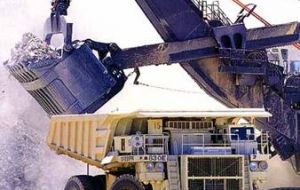MercoPress. South Atlantic News Agency
Chile plans to invest 17 billion US dollars in mining industry
 Copper is a key sector in the Chilean economy
Copper is a key sector in the Chilean economy Chile's Mining Minister Karen Poniachik disclosed Monday that Chile is anticipating 17 billion US dollars on new gold and copper mining investment in the next five years. Poniachik said the new cash infusion is needed to replace existing mines whose reserves are running out and to bolster output.
Poniachik made her remarks while participating in the London Metal Exchange Week. During her visit to London she also gave a keynote address to the more than 3,000 mining executives, consumers, and investors gathered at the event. Her address marked the first time in more than 130 years that a woman has spoken at the gathering. The new investments will be spread out over a period of five years, Ponichek said. During that time, she expects Chile's copper output to rise to 6.4 million metric tons, up from the current figure of 5.6 million tons. Copper is a key sector in the Chilean economy, with exports last year reaching 33.3 billion US dollars. According to a 2007 report from the Council on Hemispheric Affairs, the daily average copper price for the first half of 2007 was about US$3.06 per pound on the London Metal Exchange. That figure was 11.5% higher than in 2006. Copper mining accoun ts for roughly 7% of Chile's total GDP, and in 2006 copper represented 57% of the country's total exports and 32 percent of its total fiscal revenues. Poniachik's announcements come as copper prices are heading for their sixth consecutive annual gain. Poniachik also confirmed that Chile's government is not interested in selling the state-owned copper agency. Chilean President Michelle Bachelet revealed in January that a group of investors had approached the government with an offer to buy the company. "CODELCO is not for sale," said Poniachik. While Poniachik's announcement will have important ramifications for Chile's business and mining communities, it has also raised strong concerns among energy and environmental experts, who link the mining industry's expansion to several potentially destructive energy projects currently in the works in Southern Chile. "In Chile, 65% of the country's electricity is currently being consumed by the mining industry," ecologist Juan Pablo Orrego, director of the environmental NGO Ecosistemas, told the Santiago Times Monday. "The Hydroaysén project directors have stated that, with the creation of new mining projects, the country's demand for energy will rise 6.8% annually (â€Ã‚¦) in other words, the directors themselves have linked hydroelectric projects in Southern Chile with mining initiatives to the North of Chile (â€Ã‚¦) but, I must be clear that the Central Interconnected Grid only extends to Region III. Still, it does include mines such as CODELCO's Andina and El Teniente and Los Pelambres. Additionally, there are new projects which are specifically sprouting up within the Central Interconnected Grid's range". Aaron Sanger, a U.S. environmentalist formerly with NGO ForestEthics and now helping lead an international effort to stop dam construction in Chile's Patagonia region, also linked the mining industry's needs to the destruction of Chile's southern Patagonia region. "Chile's government, together with some very influential business groups within Chile, is together pushing a very large energy project in Patagonia," Sanger told The Santiago Times. "If completed, all of that energy will be put in what is known as the Central Interconnected Grid. The biggest user, by far, of the energy in Chile's Central Interconnected Grid is the mining industry (â€Ã‚¦) if the industry wants to expand it will need to have more access to cheap sources of energy. The promoters of the hydroelectric projects in Patagonia are definitely promoting themselves as the new source â€" and the nearest new source â€" of the cheapest electricity Chile will ever have had." The Aysén Project is an initiative to construct five massive hydroelectric dams in Patagonia that would – if approved by government environmental authorities – generate an estimated 2,750 MW of electricity. The Project also calls for construction of a 2,000-km transmission line to transport the electricity from Chile's Region XI, an area also known as Aysén, to Chile's energy-hungry central and northern regions. Local residents in Patagonia have joined with Chilean environmentalists and activists from around the world to fight the dam project (ST, Oct. 8). This past year several influential U.S.-based environmental groups – the Sierra Club, Natural Resources Defense Council and International Rivers Network (IRN) – have thrown their weight behind the movement. Unfortunately, Mining Ministry officials did not respond Monday to e-mails and phone calls from the Santiago Times. The Santiago Times




Top Comments
Disclaimer & comment rulesCommenting for this story is now closed.
If you have a Facebook account, become a fan and comment on our Facebook Page!